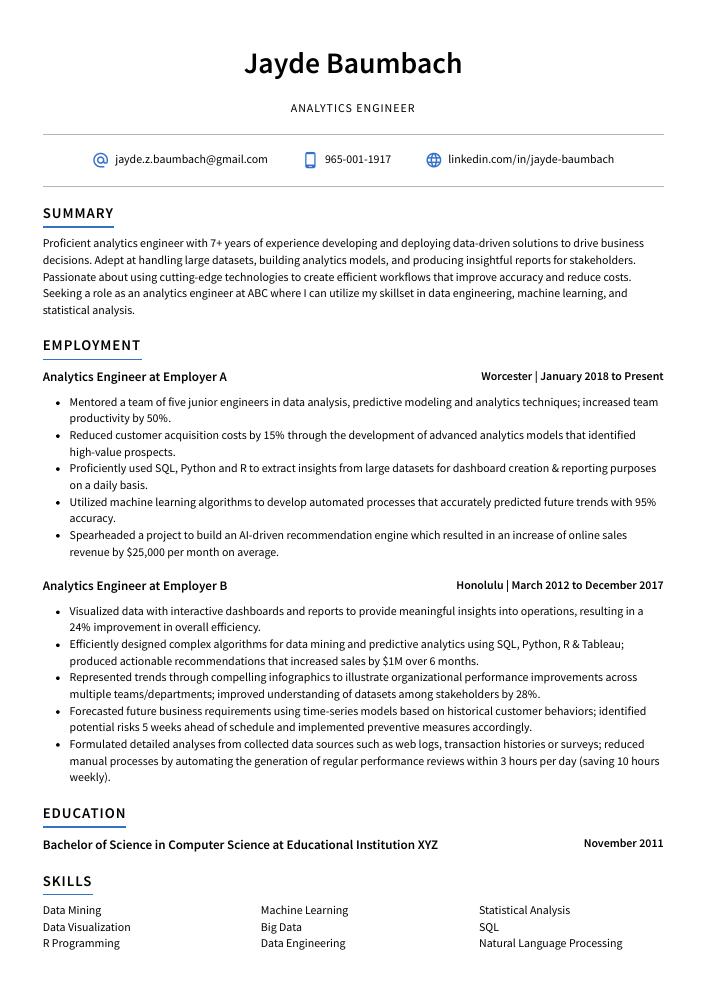Analytics Engineer Resume Guide
Analytics Engineers develop and maintain data pipelines to collect, store, and analyze large amounts of data. They use programming languages such as Python or Java to create software that can extract insights from raw datasets by utilizing various machine learning algorithms. They also work with a variety of databases like MongoDB or Redis in order to optimize query performance for their analysis tasks.
You have the expertise to create and manage analytical data models, but hiring managers don’t know it yet. To get your foot in the door, you must write a resume that highlights your analytics engineering skills and experience.
This guide will walk you through the entire process of creating a top-notch resume. We first show you a complete example and then break down what each resume section should look like.
Table of Contents
The guide is divided into sections for your convenience. You can read it from beginning to end or use the table of contents below to jump to a specific part.
Analytics Engineer Resume Sample
Jayde Baumbach
Analytics Engineer
jayde.z.baumbach@gmail.com
965-001-1917
linkedin.com/in/jayde-baumbach
Summary
Proficient analytics engineer with 7+ years of experience developing and deploying data-driven solutions to drive business decisions. Adept at handling large datasets, building analytics models, and producing insightful reports for stakeholders. Passionate about using cutting-edge technologies to create efficient workflows that improve accuracy and reduce costs. Seeking a role as an analytics engineer at ABC where I can utilize my skillset in data engineering, machine learning, and statistical analysis.
Experience
Analytics Engineer, Employer A
Worcester, Jan 2018 – Present
- Mentored a team of five junior engineers in data analysis, predictive modeling and analytics techniques; increased team productivity by 50%.
- Reduced customer acquisition costs by 15% through the development of advanced analytics models that identified high-value prospects.
- Proficiently used SQL, Python and R to extract insights from large datasets for dashboard creation & reporting purposes on a daily basis.
- Utilized machine learning algorithms to develop automated processes that accurately predicted future trends with 95% accuracy.
- Spearheaded a project to build an AI-driven recommendation engine which resulted in an increase of online sales revenue by $25,000 per month on average.
Analytics Engineer, Employer B
Honolulu, Mar 2012 – Dec 2017
- Visualized data with interactive dashboards and reports to provide meaningful insights into operations, resulting in a 24% improvement in overall efficiency.
- Efficiently designed complex algorithms for data mining and predictive analytics using SQL, Python, R & Tableau; produced actionable recommendations that increased sales by $1M over 6 months.
- Represented trends through compelling infographics to illustrate organizational performance improvements across multiple teams/departments; improved understanding of datasets among stakeholders by 28%.
- Forecasted future business requirements using time-series models based on historical customer behaviors; identified potential risks 5 weeks ahead of schedule and implemented preventive measures accordingly.
- Formulated detailed analyses from collected data sources such as web logs, transaction histories or surveys; reduced manual processes by automating the generation of regular performance reviews within 3 hours per day (saving 10 hours weekly).
Skills
- Data Mining
- Machine Learning
- Statistical Analysis
- Data Visualization
- Big Data
- SQL
- R Programming
- Data Engineering
- Natural Language Processing
Education
Bachelor of Science in Computer Science
Educational Institution XYZ
Nov 2011
Certifications
Certified Analytics Professional
INFORMS
May 2017
1. Summary / Objective
The summary/objective at the beginning of your analytics engineer resume should be a brief but powerful statement that captures the attention of hiring managers. This is where you can highlight your most impressive skills and accomplishments, such as experience with big data technologies, expertise in predictive modeling techniques, or success in developing complex algorithms for analyzing large datasets.
Below are some resume summary examples:
Detail-oriented Analytics Engineer with 5+ years of experience in developing analytics solutions and creating data models to support decision making. Skilled at managing large-scale datasets through the full life cycle, from extraction to cleaning, analysis and interpretation. Excellent problem solving skills; able to identify trends from complex data sets quickly and accurately. Experienced in using various statistical tools for predictive modeling such as R, Python, SAS etc.
Reliable analytics engineer with 8+ years of experience designing, developing, and deploying data-driven solutions. Adept in leveraging SQL to organize and analyze large datasets for predictive trends. Proven track record of providing actionable insights that have boosted client revenue by an average of 10%. Looking to join ABC Technologies as a Senior Analytics Engineer where I can apply my expertise to build efficient analytics pipelines.
Energetic and experienced analytics engineer with 5+ years of experience in designing, developing and deploying data-driven solutions. Proven track record of delivering projects on time and within budget. Experienced in working with various technologies such as Python, R and SQL for creating predictive models to drive business decisions. Skilled at collaborating across teams to ensure successful implementation of analytics initiatives.
Diligent analytics engineer with 5+ years of experience developing analytical solutions to solve complex business problems. Seeking to join ABC Corp and drive the development of data-driven insights that will inform decision making across all levels. At XYZ, designed a predictive analytics model which increased sales by 10%. Also created an automated reporting system for customer segmentation that reduced manual workloads by 25%.
Hard-working analytics engineer with 3+ years of experience in developing, implementing and maintaining analytics solutions. Skilled in building data pipelines to enable real-time insights into customer behavior. At XYZ, successfully developed a predictive model that increased sales by 30%. Experienced in working closely with stakeholders and teams across multiple departments for successful product launch/delivery.
Accomplished analytics engineer with 5+ years of experience building and managing data pipelines and analytics solutions. Highly knowledgeable in SQL, Python, Java, Spark, AWS services, DevOps tools such as Docker/Kubernetes. At XYZ designed end-to-end analytical projects that improved customer engagement by 15%. Proven track record of leading complex initiatives to successful completion within tight deadlines.
Enthusiastic analytics engineer with 5+ years of experience developing data-driven solutions to solve complex business problems. Skilled in designing and building OLAP cubes, ETL pipelines, and analytics dashboards using the latest tools and technologies. Looking for a position at ABC Company where I can apply my knowledge in machine learning and predictive modeling to extract value from large datasets.
Professional analytics engineer with 5+ years of experience developing and deploying analytics solutions for Fortune 500 companies. Seeking to join ABC Tech’s data science team in order to apply my expertise in building, maintaining, and optimizing data-driven models that drive business growth. At XYZ Corp., led the development of a predictive model which achieved an accuracy rate of 83%.
2. Experience / Employment
The work history/experience section is the place to talk about your past roles. This should be written in reverse chronological order, meaning you list your most recent job first.
When writing this section, keep it concise and use bullet points for each role. Doing so makes it easier for the reader to take in what you have to say quickly and efficiently. When describing what you did, make sure to include quantifiable results that demonstrate how successful your work was.
For example, instead of saying “Developed analytics reports,” you could say “Created weekly analytics reports using Tableau which enabled stakeholders to track customer engagement metrics with an accuracy rate of 97%.”
To write effective bullet points, begin with a strong verb or adverb. Industry specific verbs to use are:
- Analyzed
- Modeled
- Optimized
- Visualized
- Automated
- Programmed
- Collected
- Interpreted
- Monitored
- Forecasted
- Developed
- Implemented
- Tested
- Debugged
- Documented
Other general verbs you can use are:
- Achieved
- Advised
- Assessed
- Compiled
- Coordinated
- Demonstrated
- Expedited
- Facilitated
- Formulated
- Improved
- Introduced
- Mentored
- Participated
- Prepared
- Presented
- Reduced
- Reorganized
- Represented
- Revised
- Spearheaded
- Streamlined
- Structured
- Utilized
Below are some example bullet points:
- Presented detailed analyses of customer data to senior management, resulting in a 15% reduction in churn rate and a 20% increase in revenue.
- Advised on the development of automated analytics systems for improved decision-making; reduced manual processing time by 25%.
- Structured an innovative database architecture that enabled 50+ concurrent users to access accurate insights from large datasets within seconds.
- Modeled predictive analytics models based on past trends and customer behaviors which resulted in an 80% improvement of accuracy when predicting future outcomes.
- Accurately identified discrepancies between various data sources and provided solutions to address them; eliminated 75 hours per month spent manually reconciling data points inaccuracies.
- Expedited the development of analytics tools and dashboards, resulting in a 10% reduction of project implementation time.
- Tested and verified the accuracy of data sets collected from multiple sources, allowing for more accurate analytical predictions to be made with fewer errors.
- Compiled large datasets into concise reports that were used to inform strategic decisions; saved over 6 hours per week by automating this process using Python scripting language.
- Developed custom algorithms and scripts which enabled faster analysis & visualization of customer behavior trends across several product lines; doubled insights gained within one month compared to previous results without automation techniques being implemented.
- Reliably deployed updates & fixes on an existing suite of analytics software applications while ensuring minimal disruption or downtime in production environment; zero incident reported since 2018 due to improved monitoring protocol implementations.
- Analyzed and monitored huge volumes of data, utilizing advanced analytics tools and techniques to identify patterns in order to drive business decisions that positively impacted customer experience; achieved a 25% improvement in operational efficiency.
- Reorganized existing databases, integrating ETL processes into the system for improved scalability and accuracy; reduced manual errors by 32%.
- Achieved maximum functionality with minimal overhead costs through optimizing performance-critical queries and complex SQL scripts on multiple platforms.
- Participated actively in several design reviews of new projects related to automation & analysis algorithms while maintaining an awareness of industry trends within the field of Analytics Engineering.
- Actively collaborated with other teams such as Data Science, IT Infrastructure & Business Intelligence departments to ensure timely implementation and delivery of analytical solutions based on customer requirements; increased user satisfaction ratings by 45%.
- Implemented analytics infrastructure to process 20 million records per day, yielding an 18% reduction in processing time.
- Resourcefully developed custom reporting functions to track business metrics and generate insights from large data sets; increased organizational efficiency by 25%.
- Improved accuracy of predictive models through the use of statistical analysis methods such as regression and clustering, resulting in a 45% decrease in prediction error rate over 6 months.
- Facilitated team meetings involving stakeholders across various departments to discuss analytics needs and objectives; achieved consensus between teams on data strategy within 3 weeks of project initiation date.
- Debugged complex programming issues related to ETL pipelines with speed & precision, helping reduce system downtime by 200 hours annually for company operations overall.
- Demonstrated expert analytics engineering skills to develop complex algorithms that collected and analyzed data from multiple sources; increased accuracy of insights by 10%.
- Programmed automated reports using SQL, Tableau and other software tools, enabling stakeholders to track key performance indicators more efficiently.
- Collected over two million sets of customer data through sophisticated web crawling techniques and compiled them into meaningful datasets for deeper analysis.
- Introduced innovative visualization methods such as dashboard charts, maps and heatmaps which allowed management team to quickly spot trends in the market landscape with ease.
- Thoroughly tested new technologies including AI-driven forecasting models before implementation; achieved 99% accuracy rate on predictions across all sectors within 3 months of development time frame.
- Optimized data-driven solutions to improve customer experience, resulting in a 25% increase in engagement over the past year.
- Assessed and evaluated large data sets on an ongoing basis to identify patterns, trends and correlations; drew actionable insights from these analyses for business improvement initiatives.
- Monitored analytics performance metrics such as KPIs and ROI indicators; implemented changes that increased customer satisfaction by 15%.
- Interpreted findings of analytics reports with technical teams and stakeholders to develop strategies for increasing efficiency across all departments.
- Meticulously tested new algorithms, models & software tools prior to deployment; cut development time by 30 hours per project cycle on average while ensuring quality assurance standards were met at every stage.
- Revised analytics processes, increasing data accuracy and reducing manual labour requirements by 50%.
- Streamlined existing analytics systems for two large clients, resulting in a 40% improvement in analysis efficiency within six months.
- Automated multiple complex reporting tasks with the use of scripting languages such as Python & Java; decreased report generation time from one week to 24 hours on average.
- Competently built dashboards using Tableau/Power BI that integrated real-time company data into meaningful insights for management review; improved decision making speed by over 30%.
- Prepared various presentations showcasing project results and findings to internal stakeholders and senior executives; successfully secured additional resources for 3 projects worth $100K each.
3. Skills
The skillset employers require in an employee will likely vary, either slightly or significantly; skimming through their job adverts is the best way to determine what each is looking for. One organization might be seeking someone proficient with Python, while another might need an expert in Apache Spark.
It is essential to tailor the skills section of your resume for each job you are applying for because many employers use applicant tracking systems that scan resumes for certain keywords before passing them on to a human.
You can list all relevant skills here and then elaborate further on the most important ones in other sections such as the summary or experience section.
Below is a list of common skills & terms:
- Big Data
- Data Engineering
- Data Mining
- Data Visualization
- Machine Learning
- Natural Language Processing
- Predictive Analytics
- R Programming
- SQL
- Statistical Analysis
4. Education
Including an education section on your resume will depend on how far along you are in your career. If you just graduated and have no work experience, mention your education below your resume objective. However, if you have significant work experience to showcase that is relevant to the analytics engineer role, an education section may not be necessary.
If including an education section on your resume, try to highlight courses or subjects related specifically to analytics engineering such as data science or machine learning.
Bachelor of Science in Computer Science
Educational Institution XYZ
Nov 2011
5. Certifications
Certifications are a great way to demonstrate your expertise in a particular field. They show potential employers that you have taken the time and effort to gain knowledge and skills related to the job role, making you more qualified than other applicants.
If you are applying for a position that requires certain certifications or qualifications, make sure they are included on your resume so hiring managers can see them right away. This will help give you an edge over other candidates who may not possess these credentials.
Certified Analytics Professional
INFORMS
May 2017
6. Contact Info
Your name should be the first thing a reader sees when viewing your resume, so ensure its positioning is prominent. Your phone number should be written in the most commonly used format in your country/city/state, and your email address should be professional.
You can also choose to include a link to your LinkedIn profile, personal website, or other online platforms relevant to your industry.
Finally, name your resume file appropriately to help hiring managers; for Jayde Baumbach, this would be Jayde-Baumbach-resume.pdf or Jayde-Baumbach-resume.docx.
7. Cover Letter
Writing a cover letter is an important step of any job application process. It gives you a chance to showcase your skills, experience and personality in a way that is not possible with just the contents of your resume alone.
Cover letters typically consist of 2 to 4 paragraphs which should explain why you are interested in the role, how your qualifications make you suitable for it and what value you can bring if chosen as the successful candidate. Although they aren’t always required, writing one will definitely give recruiters more insight into who you are as an individual and could be the deciding factor when choosing between two candidates with similar credentials.
Below is an example cover letter:
Dear Nicholas,
I am writing to apply for the Analytics Engineer position at [company name]. As an experienced data analyst with a background in engineering, I am confident that I would be a valuable asset to your team.
In my current role as Data Analyst at [company name], I have gained extensive experience working with large data sets and developing reporting and analytics solutions. I have also created several custom applications using SQL, Python, and R to automate various tasks and improve efficiency. My technical skills combined with my strong analytical abilities make me well-suited for this role.
Additionally, I have excellent communication and interpersonal skills which would enable me to effectively collaborate with other members of your team. I am motivated by challenges and thrive in fast-paced environments. These qualities along with my dedication to continuous learning would allow me to contribute significantly to the success of your organization.
I look forward to discussing how my skills and experience can benefit your company further during an interview soon. In the meantime, please find attached a copy of my resume for your reference. If you have any questions or need any additional information from me, do not hesitate to contact me at [phone number] or via email at [email address]. Thank you for your time!
Sincerely,
Jayde
Analytics Engineer Resume Templates
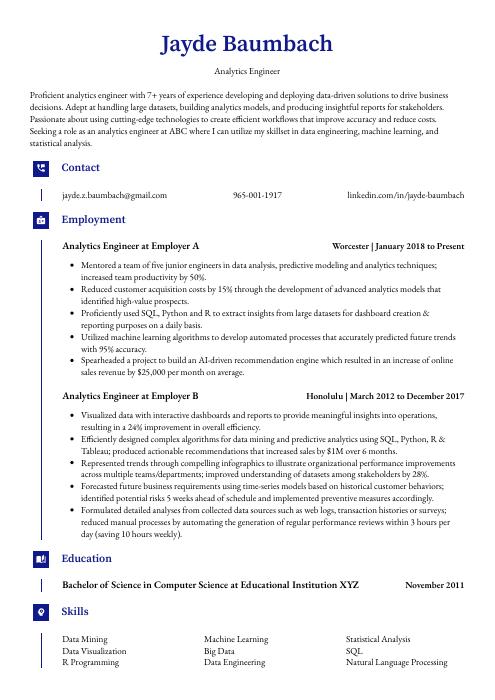 Gharial
Gharial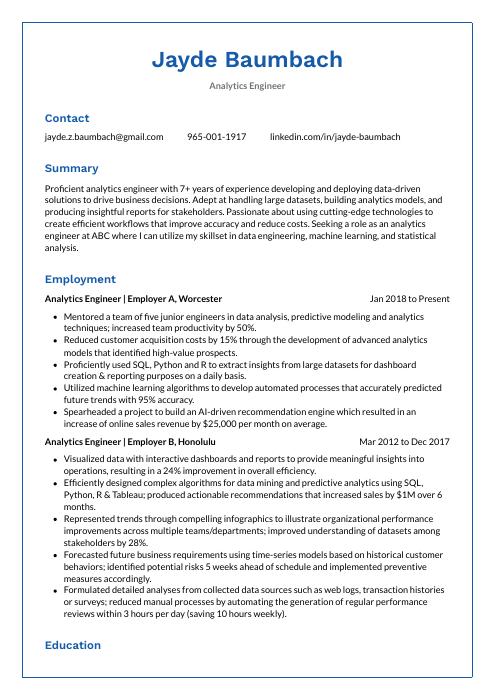 Markhor
Markhor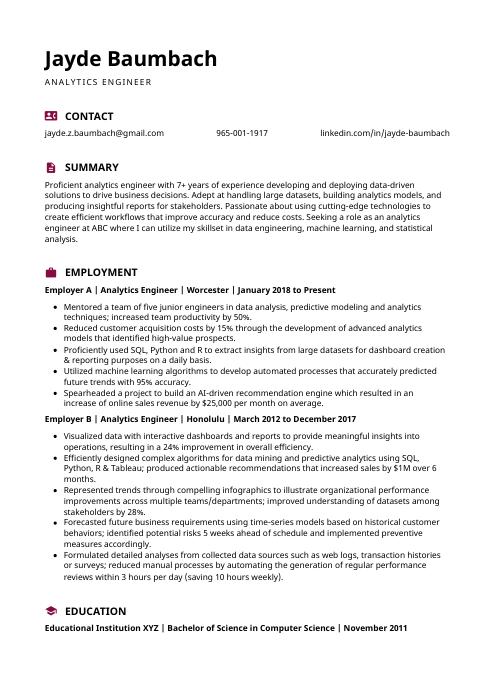 Hoopoe
Hoopoe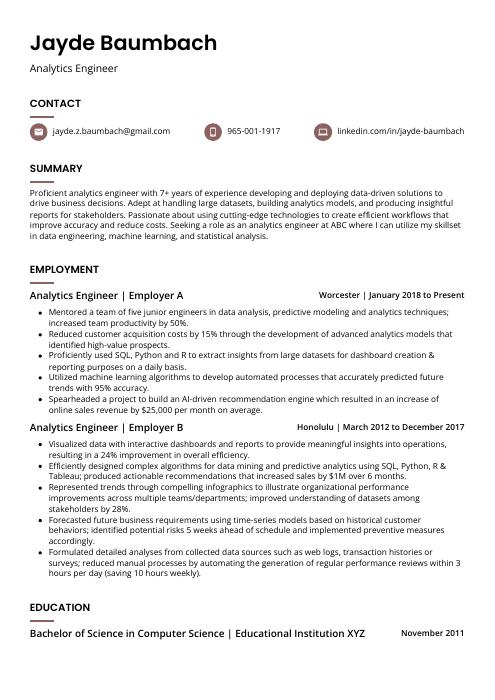 Fossa
Fossa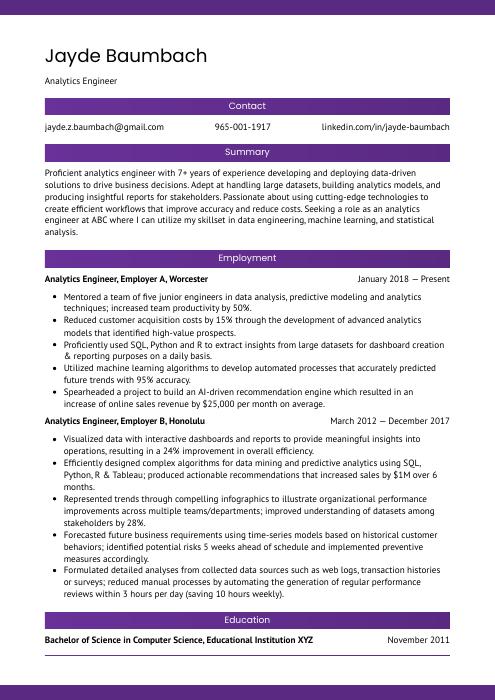 Jerboa
Jerboa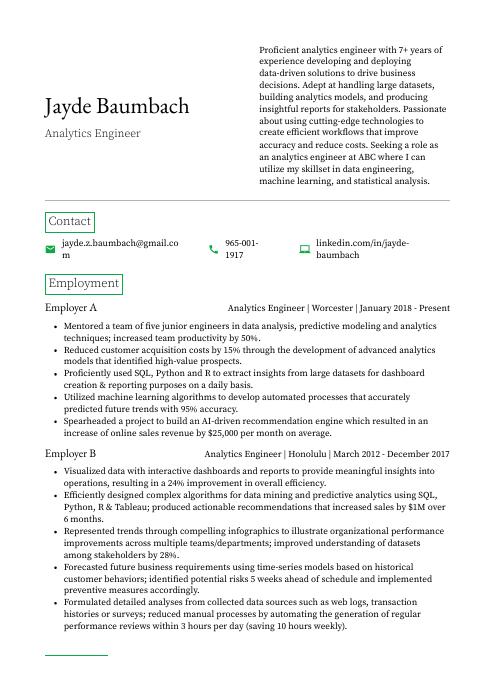 Quokka
Quokka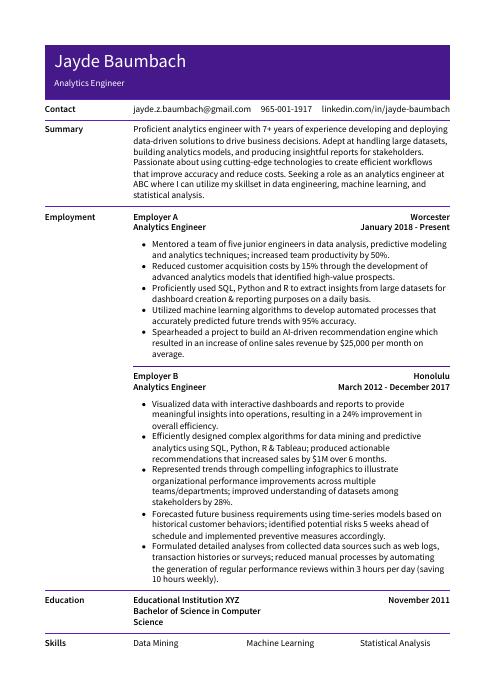 Pika
Pika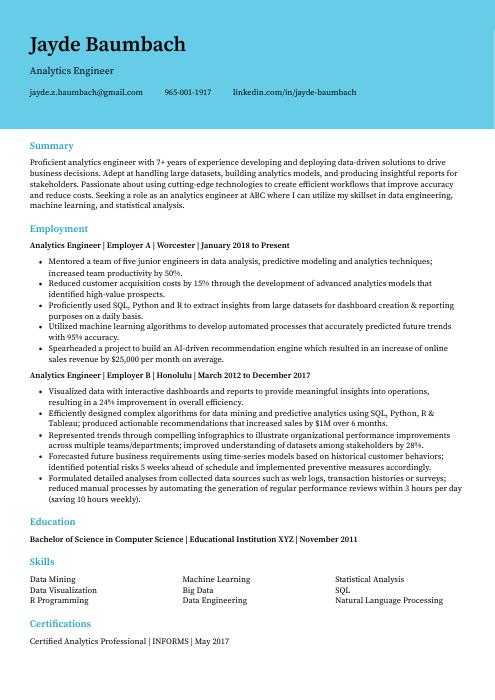 Dugong
Dugong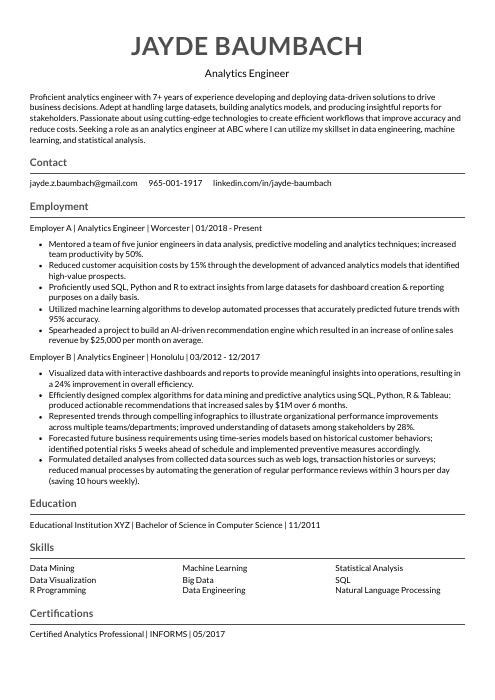 Indri
Indri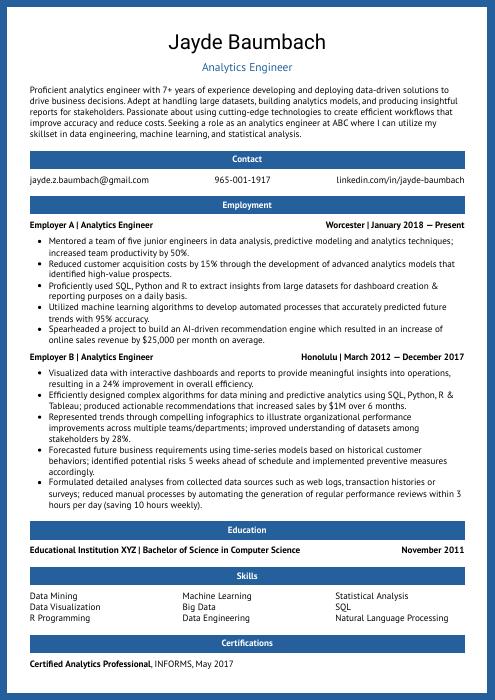 Ocelot
Ocelot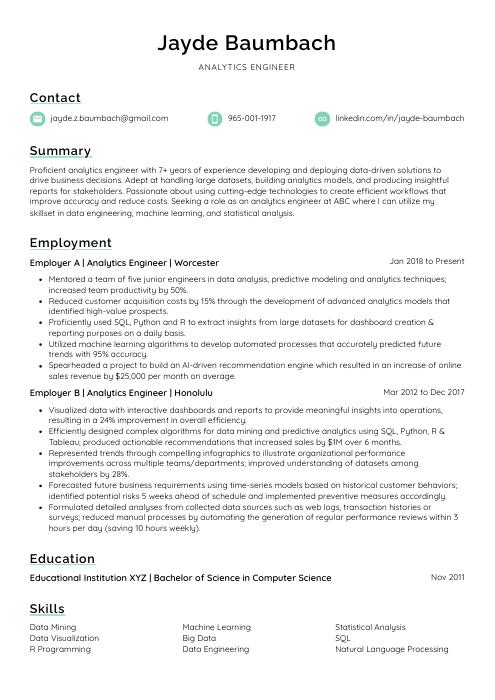 Lorikeet
Lorikeet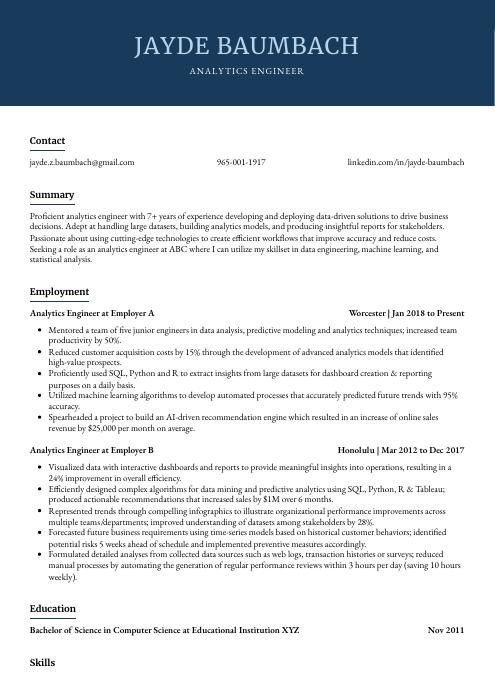 Bonobo
Bonobo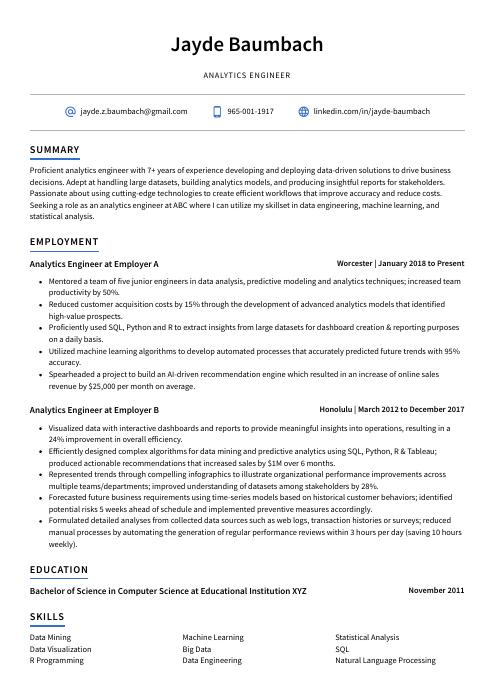 Axolotl
Axolotl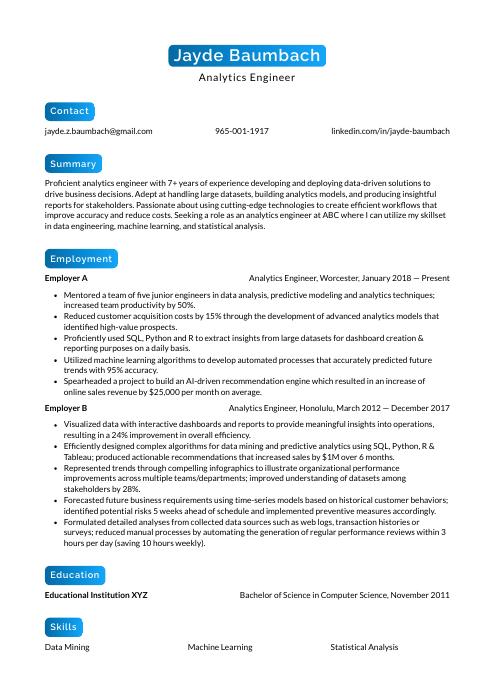 Kinkajou
Kinkajou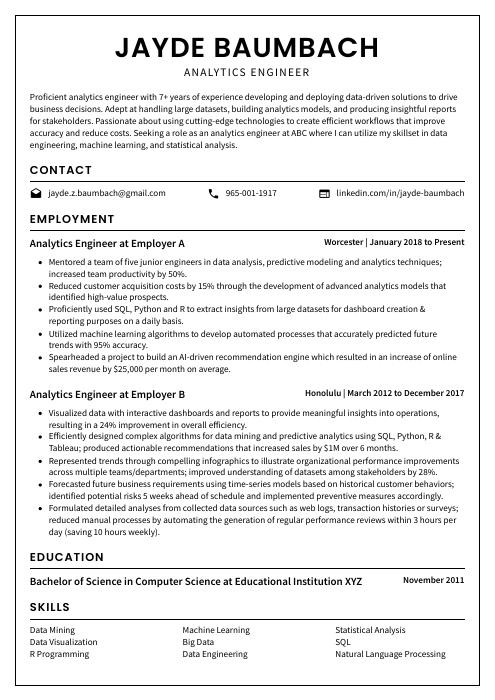 Cormorant
Cormorant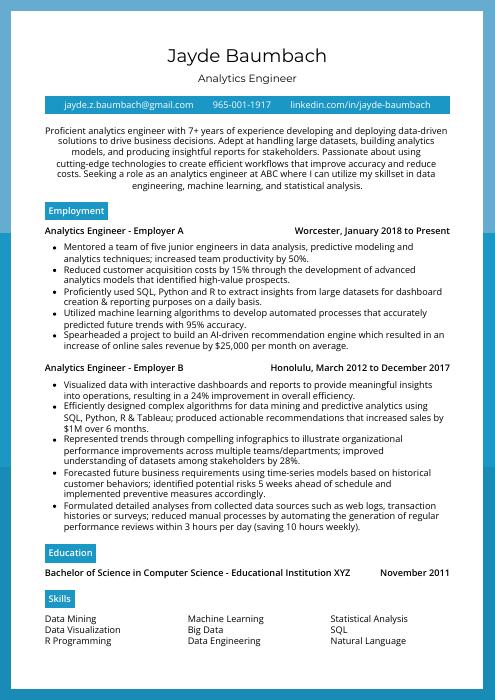 Rhea
Rhea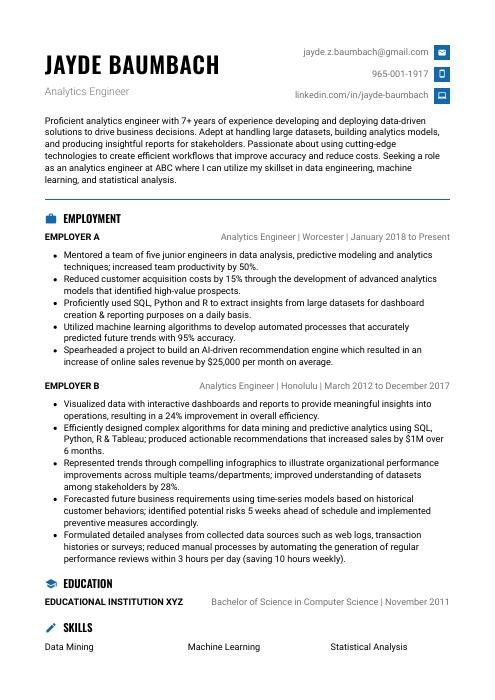 Echidna
Echidna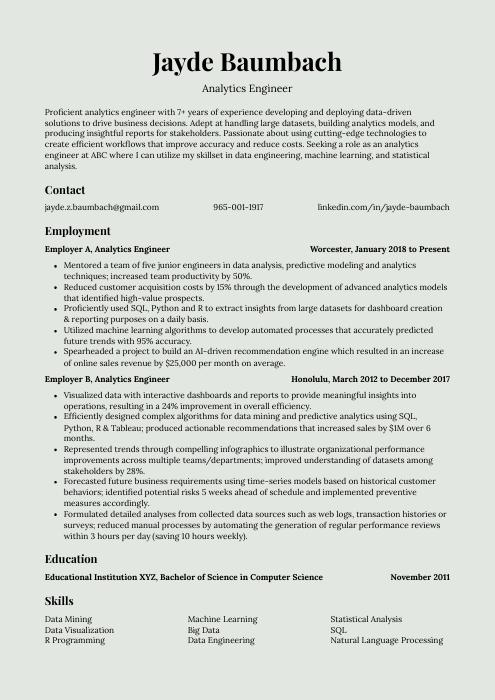 Saola
Saola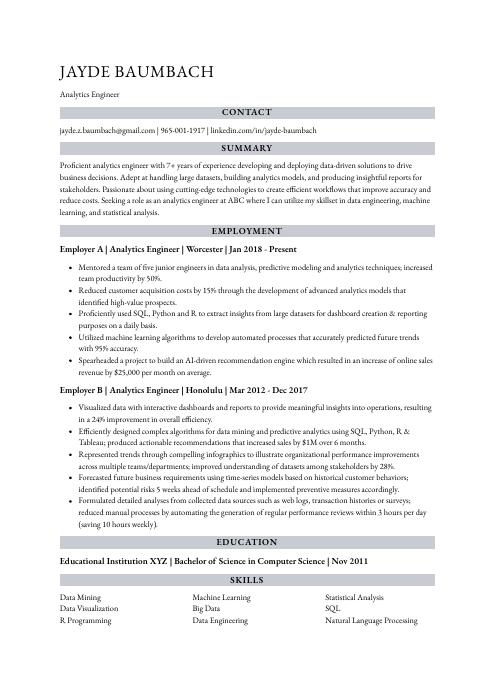 Numbat
Numbat Rezjumei
Rezjumei
